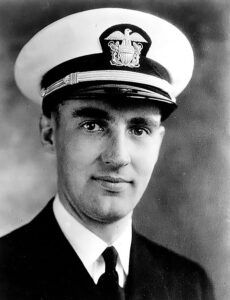
Aloysius H. Schmitt
December 7, 1941. On that day 80 years ago Japan attacked the United States at Pearl Harbor, which marked the dramatic entrance of the U.S. into World War II and the loss of hundreds of thousands of American lives.
Among those casualties were 66 Catholic priests who served in the chaplain corps. Included in that number were three Iowans — Fathers Thomas J. Barrett and Owen T. Monaghan of Des Moines and Father Aloysius H. Schmitt of Dubuque.
All three men were heroes, but the story of Father Schmitt is particularly compelling. He was, in fact, the first among all the U.S. chaplains during World War II to give his life for his country. He died on Dec. 7 while ministering to shipmates on the USS Oklahoma in Pearl Harbor.
Aloysius Schmitt was one of 10 children born to a farm family in St. Lucas, Iowa. A bright child, he was destined for college and eventually the priesthood. He graduated from Columbia College (now Loras) in Dubuque in 1932, responded to a call to the priesthood and was ordained in 1935. After a time in pastoral work in Iowa and Wyoming, he joined the chaplains corps.
Father Schmitt’s deep love for his faith and his country led him to accept an officer’s commission in the U.S. Navy and eventual assignment to the Oklahoma. He knew that men in uniform needed the comfort of the sacraments. These men would be his parish.
The events of Dec. 7 are well documented. Nine torpedoes and numerous bombs hit the Oklahoma. The ship rolled in 50 feet of water and many of the 1,300 sailors on board were trapped below decks. Some men were able to escape on their own and rescue crews saved others, but 429 died as the Oklahoma sank to the bottom of the harbor.
Father Schmitt might well have escaped but he would not leave his men behind. Repeatedly, he pulled sailors from the wreck and calmed them with prayer and personal blessings. He died among his parishioners and was awarded the Silver Star and the Navy and Marine Corps medals for heroism.
Sadly, many of the recovered bodies were too disfigured to be identified. Father Schmitt was believed to be among those sailors. All that remained of the gallant priest were two personal items — a chalice and a breviary, which were donated to Loras College.
Father Schmitt was not forgotten, however. In the years after the war, the chapel at Loras was dedicated in his honor. The U.S. government never gave up the hope of someday identifying his earthly remains and those of the other unidentified sailors who rested in collective graves.
Fast forward to 2016. Thanks to God’s blessing and modern technology, government laboratories used DNA to identify specific bone fragments as those of Father Schmitt. These precious relics were returned to Dubuque where they were buried in the chapel dedicated to him.
That is the great irony in the story of Aloysius Schmitt. Not only was he the first chaplain of World War II to die, but he was also the last to find his final place of rest. His short life is the definition of sacrifice to God and country. Let’s remember him and the other chaplains who made that ultimate sacrifice.
(Timothy Walch is a lay director of St. Thomas More Parish in Coralville and a member of the Board of Directors of The Catholic Messenger.)











